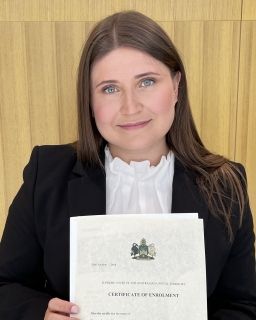Emma Henke
Seeing inequality deeply gripes me, and rectifying inequality really strives and motivates me like nothing else does.
By Evana Ho
Emma Henke’s strong sense of social justice developed early. From Indigenous rights, refugee rights, and women’s rights, to animal welfare, Emma has spent much of her life contributing in these areas.
“Seeing inequality deeply gripes me, and rectifying inequality really strives and motivates me like nothing else does,” says Emma, who graduated with a Bachelor of Development Studies and Bachelor of Law (Hons) in 2020.
Before she started her double degree at the Australian National University, Emma worked for World Vision and was on the Youth Board for the Variety (the Children's Charity). She also accrued a lot of experience in debating and public speaking, in high school and during her law degree.
“I like to be able to speak, express my opinion, form an argument,” Emma says.
“One of my particularly favourite experiences was representing ANU at the Australian Law Students’ Association Witness Examination Competition.”
Emma considers her experiences with the Indonesia Field School, which she undertook as part of her Bachelor of Development Studies, as another highlight of her time at ANU. Emma and a group of ANU students spent three weeks in a village in Sumba, Indonesia. Together with students from Duta Wacana University in Indonesia, they first spoke to the Sumba community to understand their needs and interests then worked on tackling one of them.
“I found it really interesting to learn about these people’s culture and history, but also, I think we had a positive impact in recording [the community’s stories, which] they were so worried about losing and slipping away as tourism becomes more popular on the island,” Emma says.
Her experiences and knowledge gained through the Indonesia Field School fulfilled an intention she brought to her development studies degree.
“[Coming to the ANU], I understood how issues made me feel, but I didn’t understand really what development was and how development can be empowering,” Emma says.
“I think that’s something I was really keen to learn more about, and I was also keen on the international relations aspect of the [Bachelor of Development Studies] to learn core philosophies and core schools of thought which inform different development perspectives. I gained a lot from learning about participatory development and bottom up approaches.”
Emma touts the benefits of studying an arts degree and a law degree simultaneously, which provides a great balance.
“I think being at university is a unique time in your life where your key focus is learning even if you have part time jobs,” Emma says.
Emma’s time at the ANU has been full and productive. It’s a testament to Emma’s mettle that the gamut of what she has done can only be briefly listed.
There was the year she spent as the Director of the Network of Women’s Students Australia, organising a six-day conference for 200 attendees at ANU and leading a student protest against sexual assault at Parliament House. That same year, Emma went on exchange at the University of Groningen in the Netherlands, where she was born, and learned about that country’s approaches to development. The summer break of the following year, Emma interned at both the Department of Public Prosecutions in Alice Springs and Aboriginal Legal Service in Kalgoorlie. Drawing from these experiences, Emma wrote a paper exploring the impact of courtroom architecture on access to justice. The year after that, Emma took part in the Australian National Internship Program, where she served as a Research Intern in the office of Hon Maria Vamvakinou MP and wrote a paper on refugee issues.
Outside of university, Emma spent two years as a Paralegal working in personal injury, before becoming a Paralegal with Legal Aid ACT which she found incredibly rewarding.
Emma also found the time to research and write an honours thesis in deficit and strengths-based discourse with respect to Aboriginal and Torres Strait Islander peoples in the ACT Supreme Court.
This month, following the completion of her degrees and having been admitted as a solicitor, Emma moved to Darwin to commence the role of Associate to Justice Sonia Brownhill in the Supreme Court of the Northern Territory. Her duties will be broad, which she’s looking forward to, along with being able to see the broad array of advocates that come before her. Emma is particularly excited about working with Justice Brownhill, whom she describes as a prominent legal mind in the Northern Territory.
“I chose to go to Darwin because of my deep interest in criminal justice, sparked by the intersection of my law degree and my development studies degree,” Emma explains.
The Northern Territory Supreme Court is a crime heavy jurisdiction, she continues, and because of the disproportionate rate of incarceration of Indigenous Australians, especially in the Northern Territory, many of the defendants there are Indigenous
In beginning this significant new chapter of her career, it seemed like a pertinent question to ask what Emma’s ultimate goal is. She replies that a key focus for her going into her early career is criminal justice, and that she hopes to learn more about the criminal justice system and its flaws and shortcomings.
“[I want to do this], she says, “both because I believe that with this understanding I can assist people for whom a legal problem is usually the tip of the iceberg of systemic disadvantage navigate the system, and because one day I would like to be in a position to make changes to the system – be that through strategic litigation or policy.”

Degree
Learn more about Emma Henke's degree: